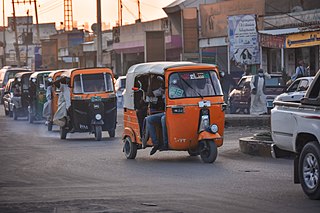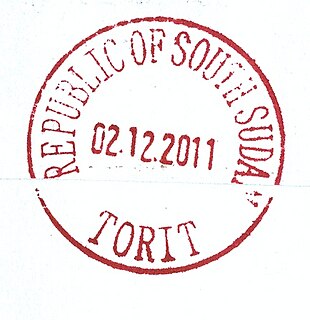See also
Lists of schools in Africa by country | |
|---|---|
| Sovereign states |
|
States with limited recognition | |
Dependencies and other territories |
|
This is a list of notable primary and secondary schools located in the African country of Sudan.

Khartoum or Khartum is the capital of Sudan. With a population of 5,274,321, its metropolitan area is the largest in Sudan. It is located at the confluence of the White Nile, flowing north from Lake Victoria, and the Blue Nile, flowing west from Lake Tana in Ethiopia. The place where the two Niles meet is known as al-Mogran or al-Muqran. From there, the Nile continues north towards Egypt and the Mediterranean Sea.

Gordon Memorial College was an educational institution in Sudan. It was built between 1899 and 1902 as part of Lord Kitchener's wide-ranging educational reforms.

Nyala is the capital of the state of South Darfur in the south-west of Sudan.

Torit is a city of Eastern Equatoria State in South Sudan.

Wad Madani or Madani is the capital of the Al Jazirah state in east-central Sudan. Wad Madani lies on the west bank of the Blue Nile, nearly 85 miles (136 km) southeast of Khartoum. It is linked by rail to Khartoum and is the center of a cotton-growing region. The city is also the center of local trade in wheat, peanuts, barley, and livestock. It is also headquarters of the Irrigation Service. In 2008, its population was 345,290. It is the home of the Al Jazirah University, the second biggest public university in Sudan. Further, there is Wad Medani Ahlia University, a private university.

The University of Khartoum is a public university located in Khartoum, Sudan. It is the largest and oldest university in Sudan. UofK was founded as Gordon Memorial College in 1902 and established in 1956 when Sudan gained independence. Since that date, the University of Khartoum has been recognized as a top university and a high-ranked academic institution in Sudan and Africa.

Education in Sudan is free and/or compulsory for children aged 6 to 13 years. Primary education up to the 2019/2020 academic year consists of eight years, followed by three years of secondary education. The primary/secondary educational ladder of 6+3+3 years was switched in 1965 and during the Omar al-Bashir presidency to 8+3 and is scheduled, during the 2019 Sudanese transition to democracy, to return to 6+3+3 in the 2020/2021 academic year. The primary language at all levels is Arabic. Starting in the 2020/2021 academic year, English is to be taught starting at kindergarten. Schools are concentrated in urban areas; many in the South and West were damaged or destroyed by years of civil war. In 2001 the World Bank estimated that primary enrolment was 46 percent of eligible pupils and 21 percent of secondary students. Enrolment varies widely, falling below 20 percent in some provinces. Sudan has 36 government universities and 19 private universities, in which instruction is primarily in Arabic.
Abed Elrahim Abu Zakrra or AbuZikreea was a Sudanese writer, poet, and translator.
Ali El-Makk, full name Ali Muhammad Ali El-Mak, also spelled Ali El-Maak or Ali Makk, was a Sudanese writer, translator and literary scholar, known for his short stories, translations from English into Arabic and literary studies.

The history of the Jews in Sudan goes back to when a small but vibrant community of Jews lived in Sudan from about 1885 to around 1970, with most of the community leaving for Israel or Europe after anti-Semitic attacks began to spread against both the Jews in Israel and those still living in Sudan.
Sudan is still one of the largest countries in Africa even after the split of the Northern and Southern parts. It is one of the most densely populated countries in the region and is home to over 37.9 million people.

Arop Yor Ayik was a South Sudanese academic and politician.
Education in South Sudan is modelled after the educational system of the Republic of Sudan. Primary education consists of eight years, followed by four years of secondary education, and then four years of university instruction; the 8 + 4 + 4 system, in place since 1990. The primary language at all levels is English, as compared to the Republic of Sudan, where the language of instruction is Arabic. There is a severe shortage of English teachers and English-speaking teachers in the scientific and technical fields.

Comboni College for Science and Technology (CCST), originally Comboni College for Computer Science, is a private college in Khartoum, Sudan, established as a technical college since 2001. It goes back to the earlier school for boys, founded by Catholic priests from Italy in 1929.
Nahid Toubia is a Sudanese surgeon and women's health rights activist, specializing in research into female genital mutilation.

Mandour El Mahdi, also known as Ustaz Mandour El Mahdi, was one of the key pioneers in the development of Education in Sudan after the country received independence from Britain in 1956, and he later became Director of Education in Saudi Arabia. He is also the author of A Short History of the Sudan (1965) which was one of the first history books to be written about what was then Africa's biggest country; it was used for the history syllabus in Sudan up until 1989.

Al Amarat is a large district and one of the most prestigious neighbourhoods in Khartoum city.
Haga Kashif Badri is a Sudanese women's rights activist, one of the pioneer women in Sudanese education.
Lilian Margaret Passmore Sanderson was an English teacher and educationalist who became known for her research on female genital mutilation, particularly in Sudan. She was the author of Against the Mutilation of Women: The Struggle Against Unnecessary Suffering (1981) and Female Genital Mutilation, Excision and Infibulation: A Bibliography (1986).

Khartoum is the main location for most of Sudan's top educational bodies. There are four main levels of education: